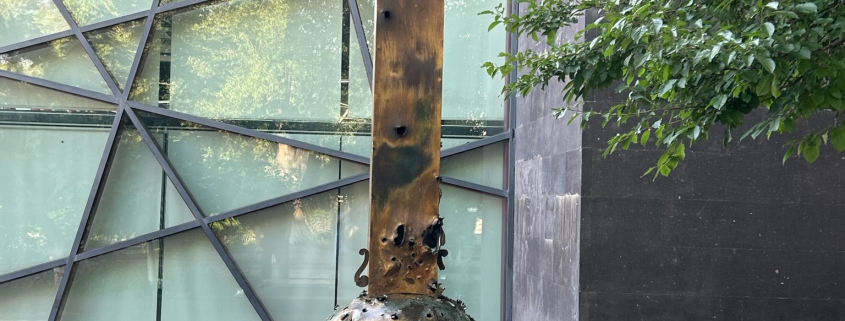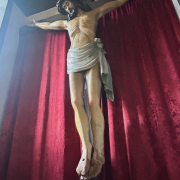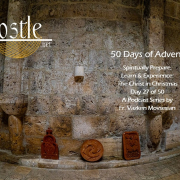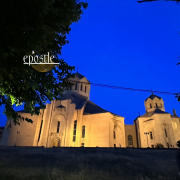Bulleted Cross
Roots of Armodoxy: The Bulleted Cross
This week on the Roots of Armodoxy, we are looking at memories from different vantage points that we discovered in Gyumri, the second largest city in Armenia. This is the fourth of five episodes of this mini-series of daily messages.
The manner in which a memory is articulated can honor the past, while at the same time bring healing, so as to ensure a forward movement from the event.
Outside the front doors of the Church of the Seven Wounds is a brass cross that looks like it was used for target practice at a firing range. Sadly, it was. In 1937, a group of clergymen of the Armenian Church were executed in an area called Haykadzor, a small section of Ani that is in Armenia proper, near the Armenian Turkish border. The Cross, with bullet holes and all, is displayed atop a brass sphere, which is also riddled with bullet holes. It casts its shadow on the names of a couple dozen clergymen, inscribed on large marble slabs below the cross.
An engraved marker proclaims, “The Cross of Haykadzor’s St. Gregory the Illuminator Armenian Church fired on by Turk and Soviet atheists. The cross is moved here in memory the priests from the Diocese of Shirak who were shot.”
This monument, with the relocated cross and the inscription was placed in Gyumri in 2018. The choice of words on the plaque was interesting to me, specifically identifying the culprits as “atheists.” With this word a very strong and meaningful sentence is imposed on the evil doers. It identifies the intention of the perpetrator and lays blame on them. There is no doubt, after reading the statement about what happened and for what reason.
Many times, our memories, especially memories of horrid events or traumatic episodes in our life, are areas that keep us stuck and living in the past, particularly in the case of unresolved conflicts. To label them for what they are, for instance with the phrase “by the atheists,” brings resolution to the trauma. The motive of the Turks and Soviets, in this case, is clearly defined with the phrase and we can understand that it was to eliminate the Christian clerics. The memory is identified, expressed and honored. This is a necessary step to live life in the moment and not to be hampered by the weights of yesteryears.
Jesus addresses a group of people (Luke 13:1-5) who were questioning a tragedy which befell some others when a tower fell over and killed them. “Do you think that they were worse sinners than all other men who dwelt in Jerusalem?” Jesus asks. He answers his own question concisely, “I tell you, no; unless you repent you will all likewise perish.” The past is over and there is nothing that can be done to change it. What is important for Jesus, and for us as followers of Christ is that we manage ourselves and change those things that we have control over. In other words, live for today.
Let us pray, Lord our God, you have given us a chance to renew each and every day, each and every minute of the day. Keep my eyes focused on the moment. Help me to move on from the past in a spirit of repentance, knowing you have forgiven me for past wrongs and the moment of today is before me to grasp and live in peace and harmony, in accord with your commandment to love. Amen.

 2023 Epostle.net
2023 Epostle.net
 2025 Epostle
2025 Epostle 2023 Epostle.net
2023 Epostle.net 2023 Epostle
2023 Epostle 2025 Fr Vazken
2025 Fr Vazken




Leave a Reply
Want to join the discussion?Feel free to contribute!